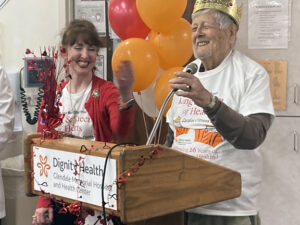
By Mikaela STONE
The Kings and Queens of Hearts event is a heart-focused health fair hosted inside the halls of the Glendale Memorial Hospital and Health Center (GMHHC). It offers heart healthy snacks, free health tests and information. Feb. 29 marked 26 years the hospital has celebrated coronary event survivors and the event’s return after COVID.
Honorees are chosen from those in cardiac rehab, post-treatment, who have made a commitment to changing their lifestyle to keep their hearts healthy. The senior king and senior queen of hearts, 80-year-old James Radon and 94-year-old Victoria Neutra, are a married couple who met while working in real estate – an industry in which Radon still works!
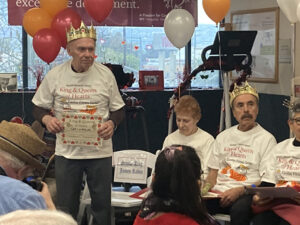
Radon participated in a heart walk 5K alongside the junior king of hearts Moises Moya, who survived open heart surgery. Moya has lived 50 years in Glendale and learned two things: “It feels good to be king” and “Enjoy life, try to eat healthy and exercise.”
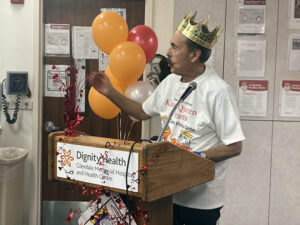
The junior queen of hearts, Cecilia Quintana, has an extensive history with the hospital’s cardiac fitness center and also with the local community. She is known as an excellent teacher who now enjoys retirement.
Years before Quintana’s open heart surgery, Glendale Memorial Hospital named a parent of one of her students as the very first junior queen of hearts. Quintana’s fitness goal is to walk the stairs of the Dodger Stadium by May 2024.
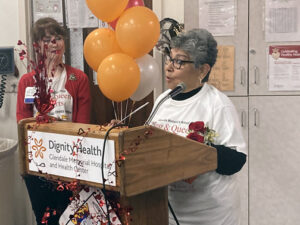
Finally, the cardiac rehab awarded the Young At Heart award to Allan Weeks, who enjoys telling jokes and photography. Weeks received not only a signed certificate from State Senator Anthony Portantino (as did all honorees), but also a teddy bear. He said his fitness goal is “staying alive” and has nothing but glowing praise for those employed at the clinic.
Throughout the hallways, the fair offered booths where volunteer nursing students and clinic staff offered free tests that could be done in five minutes or less. These included testing grip strength, which can be an indicator of overall health in seniors, a blood glucose screening for diabetes, a check for blood clots, cholesterol checking, blood pressure checking and the use of a pulse oximeter, which checks heart rate and the level of oxygen in the blood. These tests can help catch heart events before they occur. For those struggling with increased health care costs, events like this can be lifesaving as many of the tests are administered free of cost.
Visitors screened received a handout at each station explaining how best to turn their knowledge into action. For example, those with glucose levels indicating diabetes are advised to have a “yearly eye exam, kidney function tests, cholesterol checks [and] daily foot exams.” Those with blood pressure issues are recommended to hydrate properly and be aware of salt intake. Those who struggle with high blood glucose, high blood pressure or high cholesterol are advised to avoid saturated and trans fats, cease smoking and increase physical activity. As interventional cardiologist Dr. Raed Bargout would later discuss, in 2024 misleading food labels are on the rise. Undesirable ingredients such as high fructose corn syrup, which is labeled only as “fructose,” makes risk factor foods harder to avoid. He said that checking labels has never been more important. Bargout also recommends exercising for at least 30 minutes five days a week.
The fair also featured information booths representing various sectors the hospital covers with the hope of educating attendees on the services available to the public from the GMHHC. Booths presented information on how to recognize a heart attack – including pain or discomfort in the chest, lightheadedness, nausea or vomiting, jaw, neck or back pain, discomfort in the arm or shoulder, or shortness of breath; how to recognize sepsis using the acronym T.I.M.E. – temperature (higher or lower than normal), infection symptoms, mental decline, and extremely ill, usually involving severe pain or shortness of breath and how to recognize opioid overdose, which can even happen with prescription drugs. The administration of Narcan nasal spray to a person suffering an overdose can provide the patient with time to reach the hospital. Overdose symptoms can include pinprick-sized pupils, blue fingernails, issues with breathing, and cold or clammy skin (it is advised when in doubt to administer Narcan and call for help as Narcan will not negatively affect someone even if opioids are not in their body). Additional information was provided on how to identify a stroke using the acronym F.A.S.T. – face asymmetry, arm or leg weakness, speech difficulty and time (to call an ambulance immediately). As neurologist Dr. Wled Wazni detailed, the sooner one gets to the hospital for stroke treatment the better the prognosis. Within the first four hours of a stroke, a blood clot can be broken up with medication but if any more time elapses, doctors must “snake” the artery by inflating a balloon through it, which is a more invasive procedure.
Wazni recommended eating a Mediterranean diet and reminded attendees that grapefruit can interrupt the function of medications.
Other tables extolled the GMHHC’s Women’s Center, which offers maternity care, cancer support and treatments for common conditions such as endometriosis, and the Colorectal Care Center, which screens for and helps treat colon, rectal and anal cancers as well as other issues in those areas.
Building on the heart theme, one information booth discussed how to administer hands-only CPR, which teaches non-CPR-trained citizens how to administer chest compressions to give patients time for first responders to reach them. The website heart.org/handsonlycpr will detail the steps.
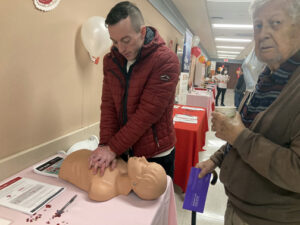
Not all the information provided was high stakes, though; the GMHHC also offers the Glendale Memorial Diabetes Education and Nutrition Program, which offers to teach people in English, Spanish, Armenian and Farsi how to manage their diabetes. Members of the 50plus Program are offered monthly education seminars and a free lunch plus social events held twice a year.
Senior service representative Pamela Flores noted, “A lot of [seniors] have lost their community coming out of the pandemic so this gives them the chance to return to the social element. Now some of them meet outside the hospital walls.”
The centerpiece of the Kings and Queens of Hearts event, though, was the Cardiac Rehabilitation Program, which helps those who suffered cardiac events recover and stay healthy. Many of the patients have been attending upwards of 20 years in order to maintain their health.
Supervised exercise therapy is also available to those diagnosed with peripheral arterial disease (PAD) in the Cardiac Fitness Center.
In his lecture, Dr. Fred Lim said PAD symptoms include repeated and worsening pain in the legs, foot or toes, wounds that heal slowly and lower temperature in the legs. One in four PAD sufferers are asymptomatic, but it can be screened for with a non-invasive test. Similar to his colleagues, he espoused the needs for exercise and proper hydration while keeping in mind the importance of electrolytes. Anyone wanting to take proactive measures before cardiovascular events occur can join Health Fit with a physician’s clearance to use the gym facilities three days a week and attend risk factor modification classes.
In light of the speakers’ emphasis on a healthy diet, those looking for cost effective ways to eat healthy are advised by the CDC to plan recipes with overlapping ingredients, shop with a list, buy frozen or canned food only when necessary, and grow a garden.
Upcoming GMHHC events include its Charity Golf Classic on June 7 at 9:30 a.m. at the DeBell Golf Club in Burbank for the GMHHC Foundation; speaker Dr. Ana McElrath-Garza will be presenting Women’s Health and Colorectal Cancer on March 14 with lunch starting at noon in the GMH Stauffer Auditorium; and the March lecture for the 50plus Program starts at noon and features Ani Vartani who will be speaking on Building a Nutritionally Balanced Diet.
Finally, anyone suffering from addiction can call the substance abuse service helpline at (844) 804-7500.
